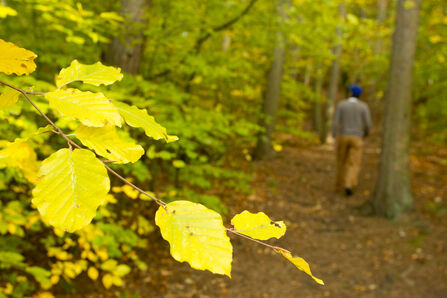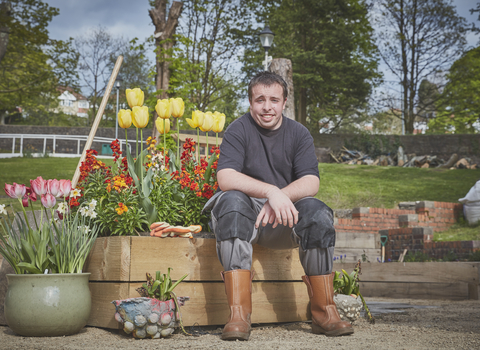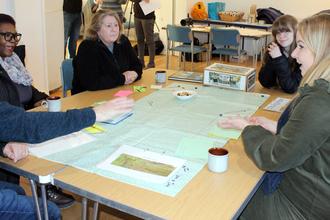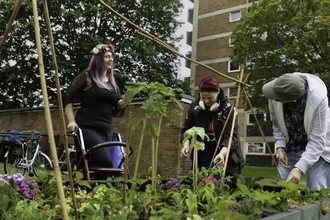Staying motivated and tackling challenges in established groups
Ruth Dennison/The Wildlife Trusts
How to keep going when your "new group energy" wears off!
This guide is for anyone working with a community group. You might work for an organisation that is supporting community groups, or you might be part of a community group yourself.


Ben Hall/2020VISION
At the start, everyone’s excited about your new project. Volunteers rush forward. People commit time and resources to making it a success. Everyone’s happy.
And there’s a lot of help for new community groups. Everyone wants you to do well.
But sometimes, after a few months or a year or two, things can go wrong. This guide is about what could go wrong, identifying why it went wrong, and what you can do to make things better again.
A key person leaves – and the project collapses
Has your project fizzled out because one particular person has left? They might have left due to personal circumstances, a change in job, location etc, or they might have left because volunteering responsibilities got too much.
When anyone leaves, it’s always worth trying to find out why. Mostly, people leave because their circumstances change or they want to do something else. That’s fine. But if a lot of people leave, you need to find out why.
If a key person leaves, and the project is in danger of collapsing, then you might need to look at how much responsibility was put on that person.
Sometimes, one person is very keen to be involved and this can lead to them taking on too much. They might say “yes” to everything, but then get overwhelmed.
What to do about it:
Make sure that your group is led by everyone, not just one or two people.
Make sure that you all have regular check-ins and that all the work is not falling onto one person – even if they are volunteering for it!
If a key person has left and the group is now breaking up, this is a good time to refocus and reset. Consider what your aims were, and what you have achieved. Share this with the group! Celebrate what you have done.
Do a skills audit. What can others offer? What support or training do they need? Spread the load.
Too many setbacks – a spiral of negativity
It can be hard to stay positive if you have a series of setbacks in a row. Funding runs out, a lease expires, a volunteer becomes unwell, a resource is vandalised.
A group needs to have an open culture where people can talk freely about their frustrations. It can be difficult, however, to stop this becoming an inward-looking doom spiral where everyone ends up feeling depressed and hopeless.
What to do about it:
Track the little wins right from the start! Create an impact bank – a way of sharing your successes, whether that’s a physical board of photos showing progress, or a virtual space.
Set boundaries for all group members. While it is useful to share frustrations, if you allow space for this in a group meeting, set a time limit. Seek ways to acknowledge the frustration, don’t dismiss it, but then as a group look for ways of dealing with it, if possible. Consider how the group interacts out of the routine meetings too. Are people venting to one another in private messages? Again, this is healthy but it can become a toxic downward spiral if all people do is complain, without seeking ways to take action.
Disbanding a group is not a failure. You may have achieved what you wanted to. You may have done as much as you are able to. You will all have learned new things and made real changes to your area or your lives. Recognise those things, and look for ways to share those successes. You may find yourself using those skills in the future – nothing has been wasted.
A lack of energy, a lack of new members, or a lack of ideas – general burnout
Everything’s running fine, or so it seems. There’s funding in place. You have volunteers who know what they’re doing. You have a plan, and you’re meeting your targets.
So why does everything feel so flat? Are people less likely to come to all your meetings? Are you seeing just the same faces at the events? Are you doing the same thing, week after week, with a sense of obligation rather than enthusiasm?
It’s time for an injection of positivity!
We asked community organisers across the UK for their advice.
Bryony, Somerset Wildlife Trust, has recently put on an event bringing together local community groups to share knowledge and ideas. She says:
Regarding how to stay motivated, events like this are key as well as the more regular networks and forums. Basically, giving energy to and allowing time for convening, commiserating and cheerleading. A big theme that came through from this year’s event feedback was people saying “I needed this” and that they valued the inspiration and connection. Many people expressed how challenging and sometimes isolating it can be working on local environmental projects, and how valuable it was to connect with other like-minded people for encouragement, ideas and sharing resources but most of all a boost to keep going.
Becky at Cheshire Wildlife Trust has a whole list of advice for the leaders of community groups, and organisations that support community groups, based on her experience:
-
Use national days and weeks for inspiration. Plan events around key dates like National Hedgehog Week, Earth Day, the City Nature Challenge, or seasonal celebrations such as wassails in January or autumn apple pressing.
-
Run guided walks and outdoor experiences. These are hugely popular and a great way to attract new people while promoting volunteering opportunities. Examples include bat walks, tree ID walks, pollinator walks, bluebell walks, dawn chorus walks, and even silent disco litter picks.
-
Invite local experts. Retired botanists, naturalists, or passionate hobbyists may be keen to lead a walk, workshop, or talk for your group.
-
Think broadly about community. It can mean a neighbourhood, workplace, school, place of worship, sports club, or group of friends. Consider who you’re not yet reaching. Don't expect the people to come to you, go to where they are.
-
Promote volunteer days well. People often join in for the more enjoyable tasks like orchard pruning, tree planting, or wildflower plug planting, so make plenty of noise about those! For tougher tasks, explain why they matter and the impact they have.
-
Try to bring storytelling into your work. Projects with memorable and creative names and aims are nice to be a part of. For example, plant a tree for every person on your street, a daffodil for everyone in the village, or display poems beside trees to encourage reflection.
-
Show appreciation. Good coffee, homemade cake, and public recognition go a long way. Share photos on social media and celebrate individual contributions.
-
Spread the word. Put posters up in local cafés, community centres, pubs, and on notice boards. Ask local mailing lists or networks to share news about your group.
-
But most of all, continue to ask your volunteers for their ideas and input. A community listening approach helps everyone feel valued, involved and more likely to contribute creatively.
Susan at the Hampshire and Isle of Wight Wildlife Trust has been involved with many groups over the years as both volunteer and staff, and notes that "it was always the same tiny group of people that did everything and people do get burnt out!" She makes these points:
-
Get fresh input! A key point to stay motivated is that groups need new people coming in from different backgrounds and with different ideas to avoid that tiny group of volunteers doing everything.
-
Look at what times you are offering. Often, the community group model doesn't work for young people. Early weekend mornings might not suit them and they might not be keen to attend meetings in a hall or someone's home.
-
A presence on social media can be useful and might be a more successful way of getting young people involved initially.
Finally, Nikki at The Wildlife Trusts makes the case for continuing to bang the drum for your group:
My top tip - Boast about the work of your community to anyone you meet because you never know what they are involved in. You may just unlock a door for funding, connections to a decision-maker, publicity - or simply enthuse someone else to join in and benefit from making new friends and more space for nature.


The Wildlife Trusts
Have you been part of a community nature project?
We'd love to hear from you! Your experiences will be shared right here on the Community Hub and will inspire others to take action in their own neighbourhoods.
Except where noted and excluding images, company and organisation logos, this work is shared under a Creative Commons Attribution 4.0 (CC BY 4.0) Licence.
Please attribute as: “Nextdoor Nature (2022-2024) by The Wildlife Trusts funded by The National Lottery Heritage Fund, licensed under CC BY 40”




